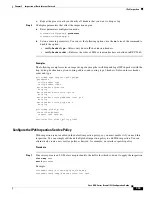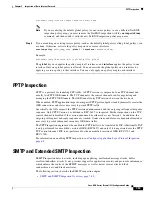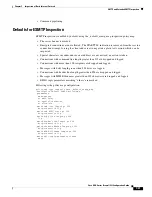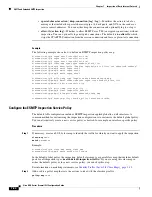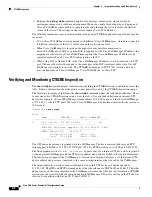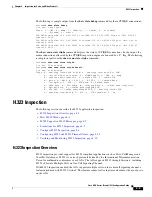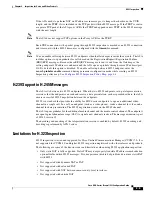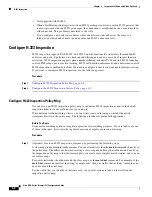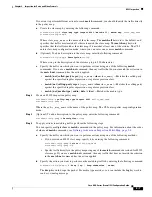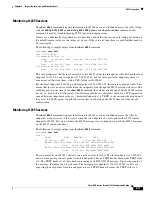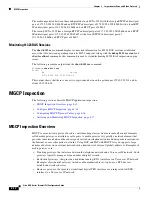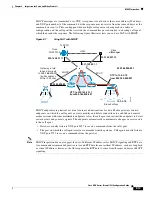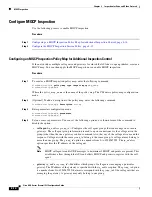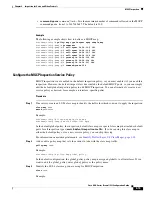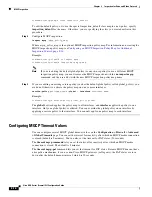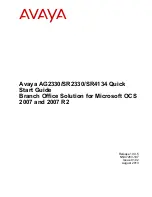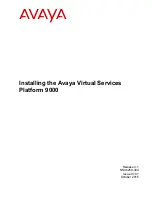
8-2
Cisco ASA Series Firewall CLI Configuration Guide
Chapter 8 Inspection for Voice and Video Protocols
CTIQBE Inspection
•
Entering the
debug ctiqbe
command might delay message transmission, which can have a
performance impact in a real-time environment. When you enable this debugging or logging and
Cisco IP SoftPhone seems unable to complete call setup through the ASA, increase the timeout
values in the Cisco TSP settings on the system running Cisco IP SoftPhone.
The following summarizes special considerations when using CTIQBE application inspection in specific
scenarios:
•
If two Cisco IP SoftPhones are registered with different Cisco CallManagers, which are connected
to different interfaces of the ASA, calls between these two phones fail.
•
When Cisco CallManager is located on the higher security interface compared to
Cisco IP SoftPhones, if NAT or outside NAT is required for the Cisco CallManager IP address, the
mapping must be static as Cisco IP SoftPhone requires the Cisco CallManager IP address to be
specified explicitly in its Cisco TSP configuration on the PC.
•
When using PAT or Outside PAT, if the Cisco CallManager IP address is to be translated, its TCP
port 2748 must be statically mapped to the same port of the PAT (interface) address for Cisco IP
SoftPhone registrations to succeed. The CTIQBE listening port (TCP 2748) is fixed and is not
user-configurable on Cisco CallManager, Cisco IP SoftPhone, or Cisco TSP.
Verifying and Monitoring CTIQBE Inspection
The
show ctiqbe
command displays information regarding the CTIQBE sessions established across the
ASA. It shows information about the media connections allocated by the CTIQBE inspection engine.
The following is sample output from the
show ctiqbe
command under the following conditions. There
is only one active CTIQBE session setup across the ASA. It is established between an internal CTI
device (for example, a Cisco IP SoftPhone) at local address 10.0.0.99 and an external Cisco CallManager
at 172.29.1.77, where TCP port 2748 is the Cisco CallManager. The heartbeat interval for the session is
120 seconds.
hostname# #
show ctiqbe
Total: 1
LOCAL FOREIGN STATE HEARTBEAT
---------------------------------------------------------------
1 10.0.0.99/1117 172.29.1.77/2748 1 120
----------------------------------------------
RTP/RTCP: PAT xlates: mapped to 172.29.1.99(1028 - 1029)
----------------------------------------------
MEDIA: Device ID 27 Call ID 0
Foreign 172.29.1.99 (1028 - 1029)
Local 172.29.1.88 (26822 - 26823)
----------------------------------------------
The CTI device has already registered with the CallManager. The device internal address and RTP
listening port is PATed to 172.29.1.99 UDP port 1028. Its RTCP listening port is PATed to UDP 1029.
The line beginning with
RTP/RTCP: PAT xlates:
appears only if an internal CTI device has registered
with an external CallManager and the CTI device address and ports are PATed to that external interface.
This line does not appear if the CallManager is located on an internal interface, or if the internal CTI
device address and ports are translated to the same external interface that is used by the CallManager.
The output indicates a call has been established between this CTI device and another phone at
172.29.1.88. The RTP and RTCP listening ports of the other phone are UDP 26822 and 26823. The other
phone locates on the same interface as the CallManager because the ASA does not maintain a CTIQBE
session record associated with the second phone and CallManager. The active call leg on the CTI device
side can be identified with Device ID 27 and Call ID 0.
Summary of Contents for ASA 5512-X
Page 5: ...P A R T 1 Service Policies and Access Control ...
Page 6: ......
Page 51: ...P A R T 2 Network Address Translation ...
Page 52: ......
Page 127: ...P A R T 3 Application Inspection ...
Page 128: ......
Page 255: ...P A R T 4 Connection Settings and Quality of Service ...
Page 256: ......
Page 303: ...P A R T 5 Advanced Network Protection ...
Page 304: ......
Page 339: ...P A R T 6 ASA Modules ...
Page 340: ......


